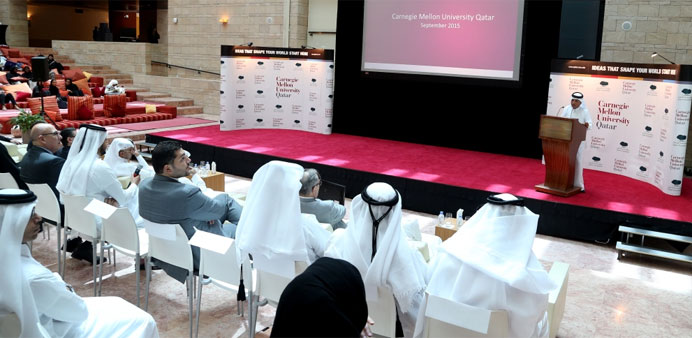By Peter Alagos/Business Reporter
Backed by a strong national budget and cash reserves, Qatar will not scale back major infrastructure projects or cut food and fuel subsidies despite declining oil prices, HE the Finance Minister Ali Shereef al-Emadi said.
Speaking at the Dean’s Lecture Series hosted by Carnegie Mellon University in Qatar yesterday, the finance minister stressed that many of the government’s $200bn infrastructure projects “are already in the execution stage.”
“We’ve already put a public planned labour action that will oversee our projects in the next 10 years and that is very important for us. The government is bent on completing all of these main projects, which is why it is business as usual for us,” al-Emadi explained.
On cutting fuel and other subsidies, the finance minister said: “Our budget is still that not far in terms of deficit…the financial situation is very healthy and I don’t think we need to take extra measures.”
“Our breakeven point when the budget (which is more than $300bn in 2014) was announced was at $65 per barrel; today, we’re averaging below that, under $50 per barrel.
“We have an almost 15-year surplus budget from 2000 to 2015, and Qatar never had any deficit. We’ve stuck with the oil prices at this level…there is enough room for us to manage this,” al-Emadi emphasised.
The finance minister also expressed optimism in the continuous growth of Qatar Central Bank’s cash reserves, which reached QR157bn in 2014.
“The central bank’s cash reserves are still growing and this is a trend that we’ve seen in least in the last seven years…we will not see a decline at any time, and this is a very important signal for our economy,” al-Emadi noted.
Given the current fluctuation in global prices, which makes it difficult to predict future oil prices, al-Emadi said: “Qatar will continue its conservative fiscal policies on maximising utilisation of available financial resources; increase efficiency in public expenditure, and ensuring the implementation of the budget as planned.”
In addition, he also said the government “will continue to implement capital expenditure plans on major projects in health, education, and infrastructure; the implementation of 2022 FIFA World Cup related-projects; support growth in non-oil sectors; and expand private sector participation in different economic activities.”
Al-Emadi also allayed concerns that some infrastructure projects will be shelved due to falling oil prices. He stressed that the government is prioritising major projects and added that “other projects are still on schedule.”
“We have a 10-year budget from 2014 up to 2024, meaning there will be infrastructure projects from now until 2022 and beyond, up to 2024…and these projects are identified and known; every ministry knows exactly where they stand in all of these projects,” the finance minister explained.
Qatar, the world's top liquefied natural gas exporter, is in the strongest financial position and a Reuters poll of economists last month found them predicting Doha would run a state budget deficit of only 0.7% of gross domestic product this year, the region's smallest deficit.

